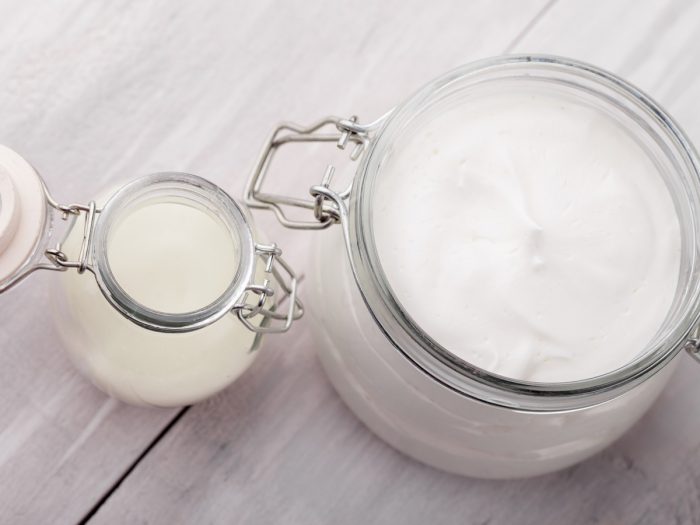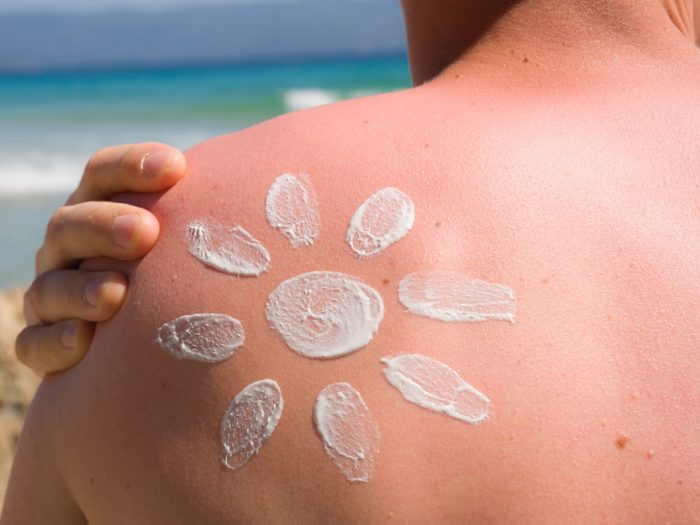Coconut oil does have certain properties of sunscreen, but if you are serious about shielding your skin from the harmful effects of the sun, you should not use this oil as your only form of protection. It does not adequately protect the skin against radiation, which is the leading cause of skin cancer and premature aging of the skin. While you may see coconut oil as an ingredient in many different sunscreens, it is only one component, and cannot replace the other substances that provide higher levels of SPF protection. Interestingly, coconut oil is actually one of the best substances for treating sunburn, but not preventing it.
In recent years, many traditional sunscreens have come under fire for their high levels of protective chemicals and additives, which may have adverse effects on the skin over the long term. However, protecting yourself against melanoma takes precedence over topical contact with potentially abrasive chemicals. There is no sunscreen on the market that can protect against all of the sun’s radiation (both UVA and UVB), but the higher the SPF, the greater the percentage of protection. [1]
There are many other ways to prevent sun damage to the skin, including wearing sun-protective clothing, such as wide-brimmed hats, long sleeves, and simple avoidance of sunlight, particularly during the peak hours of sunshine, from 10am-2pm, when the sun’s radiation will be at their strongest. [2]
What is the Natural SPF of Coconut Oil?
Coconut oil has a natural SPF of between 1 and 8, depending on the type of oil you use, the research studies you trust, and the completeness of its coverage on your skin. The American Academy of Dermatology recommends that you use SPF 30 or higher if you are trying to protect your skin from the harmful radiation of the sun. SPF 30 will protect you against roughly 97% of the sun’s rays, whereas coconut oil only protects you from about 20%. [3] [4]

Coconut oil can be used to make lip balms and sunscreen lotions. Photo Credit: Shutterstock
When you convert this into time, it means that full coverage of your body with coconut oil will only prevent sunburn and radiation damage for approximately 10-15 minutes, provided you don’t go swimming or sweat, which would lower that amount of time even further. Suffice to say, the use of coconut oil may seem like a forward-thinking choice, particularly for those who use the oil for so many other aspects of their health, but it should not be solely relied on as a sunscreen.
Is Coconut Oil Good for Sun Tanning?
Coconut oil is good for sun tanning, as it can condition and moisturize the skin as you tan, which will prevent the dryness and much of the redness that you usually experience a sunburn. However, with such a low SPF (typically between 1 and 8), you will not want this oil to be the only thing you apply to your skin. It is important that you also use a sunscreen of SPF 30 or higher, which will block the majority of the sun’s most dangerous rays. This is why many sunscreens and tanning lotions include coconut oil, because it does deliver many nutrients to the skin, but it should not be relied on in a pure form! [5]
While some people think that sunscreen will prevent them from getting any sort of tan, coconut oil can improve the appearance of your tan, and keep your skin shiny, rather than dark and dull, which can often happen when tanning. As mentioned, however, it is best to always combine coconut oil (either in spray form or a cream) beneath the second layer of SPF 30 sunscreen, or you will not be protected from the sun’s dangerous rays for more than 10-15 minutes. [6]
How to Make Homemade Sunscreen from Coconut Oil?
It is possible to make homemade sunscreen from coconut oil, but it must be combined with a number of other ingredients and natural oils if you want actual protection against the sun’s rays. Below is a simple recipe that combines oils with higher SPF levels, as well as a few common ingredients from traditional sunscreens that are relatively easy to acquire.

DIY Coconut Oil Sunscreen Recipe
Ingredients
- 1/2 cup organic coconut oil virgin
- 1/4 cup jojoba oil
- 1/2 cup shea butter
- 2 tbsp beeswax
- 2 tbsp zinc oxide powder
- 5-10 drops essential oils (lavender or vanilla) as per preference
Instructions
- Melt the coconut oil, jojoba oil, Shea butter and beeswax in a double boiler, or heat them in a glass bowl above a smaller pot of boiling water.
- Once the mixture is melted, gently stir in the zinc oxide powder
- Place the mixture in the refrigerator for 10-20 minutes. You want it to begin to settle, but not fully harden.
- Remove the mixture and add the essential oils of your choosing for fragrance.
- With a hand-mixer, whip the mixture for 5-6 minutes as it increases in volume and becomes more 'fluffy'.
- Store this homemade sunscreen in an airtight glass container, preferably in the fridge, away from excess light, heat or moisture.
- Apply this as you would apply any normal sunscreen, and re-apply every two hours to ensure protection from radiation.


